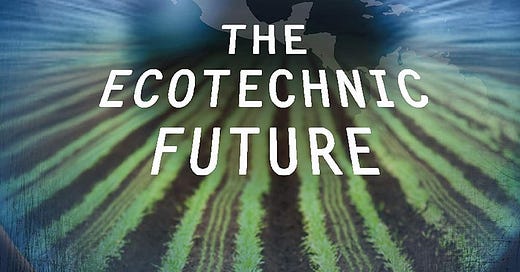[Book Review] The Ecotechnic Future
An academic discussion of an ecological post-industrial world
The Ecotechnic Future is a book that pairs well with Breaking Together. "Breaking Together" presents a nigh apocalyptic view, focusing on the failures of our current civilization and the panic gripping our elites. In stark contrast, The Ecotechnic Future offers an optimistic, Darwinian perspective on the long-term survival and adaptation of civilization.
John Greer, the author, is an adept writer who digs deep into the consequences that energy limitations will impose on human society. He refers to industrial civilization as the "first technic society," suggesting that others will follow, each emerging from the failures of the one before it. While Greer recognizes that significant upheaval will occur as we shift away from our energy-draining, wasteful way of life, he argues that this upheaval doesn’t spell the end for humanity—just a transition to something new.
Greer makes a fascinating observation about human societies—they function much like ecosystems. The rise of petroleum, a powerful source of energy, triggered a cascade of socio-ecological effects that birthed the first technic society. This first technic society is marked by reckless energy use and indulgence, paired with the creation of intricate, complex industrial systems. Now, the end of this form of society seems inevitable, and this realization has set the modern elites into a panic. But rather than signaling a sudden, catastrophic collapse, Greer predicts a series of societal successions, each taking centuries to unfold.
He explains that ecologies don't just emerge out of nothing. They develop slowly, over generations, starting with simple weeds, progressing to brushland, then young forests, and eventually maturing into old-growth forests. This gradual process means that each new ecology can only exist after the previous one has created the necessary conditions for its growth.
By this logic, when our industrial societies reach their natural conclusion, another society will take root in the soil prepared by the old.
Greer forecasts a "scarcity-industrial society" to follow our current global industrial civilization. The signs of this transition are already apparent, with growing societal strain and unrest. The elites, terrified of a world where they can't hop on private jets to remote islands whenever they want, are spiraling into panic. Once the turmoil of our current age passes, we’ll find ourselves entering an era defined by resource scarcity. Neoliberalism, which depends on unlimited resources to function, will collapse, likely replaced by a new ideology—perhaps one centered around some form of imperial nationalism. Scarcity industrialism, according to Greer, will operate under strict limits on available resources. Factories will face skyrocketing operational costs, forcing many to shut down. Nations will compete for dwindling raw materials, relying on aging military technology as their capacity to produce new tools and weapons diminishes.
Following the era of scarcity industrialism, Greer envisions the rise of a "salvage society," where humanity will adapt to the remains of previous civilizations. This will eventually give rise to new forms of technic societies, each different from the last and shaped by the availability of resources. The process will span hundreds of years, eventually culminating in a final, stable "climax" state—one that will endure for thousands, even tens of thousands of years.
In broad terms, ecologies follow a series of stages. When a forest is clear-cut, an old-growth forest doesn’t spring up immediately. First, the soil is reclaimed by weeds, followed by scrublands and brush. As time passes, fast-growing trees create the right conditions for slower-growing trees to establish themselves. Over time, the ecosystem reaches a "climax" state, a stable, mature form that will persist until something disrupts it.
Greer extends this ecological model to human society, predicting that, eventually, we will reach a human "climax society"—one that is truly sustainable. What that society will look like, though, is something we cannot yet imagine. This is where Greer shows admirable humility. He acknowledges that the ultimate form of human civilization will be vastly different from anything we see today, reminding us that even the most sophisticated of societies are in a constant state of flux, with the potential for new forms of existence to emerge.
In addition to his thoughtful analysis on energy limits, development constraints, and the likely trajectory of medium and long-term human civilization, Greer also offers practical advice for navigating the present. He provides guidance for preparing for the transition into scarcity-industrialism, with simple yet impactful recommendations. Most of this advice centers on the importance of owning land, as Greer suggests that having a solid foundation in the form of property will be key to surviving the coming changes. He emphasizes steps that families can take now to ease their way into the next phase of human civilization.
The civilization that follows our current one will be vastly different, and many of the comforts and conveniences we take for granted will no longer be available. The shift from urban sprawl back to a more structured, cottage-industry model will be challenging in some respects and easier in others. While tools like 3D printers, high-efficiency generators, and AI can prove invaluable, bureaucratic obstacles will make the transition unnecessarily difficult in many regions. For example, the sprawling city designs across the United States are hardly conducive to fostering small-scale, home-based businesses.
The Ecotechnic Future is, in my opinion, one of the most valuable forward-looking books I’ve encountered. In contrast, Breaking Together felt lackluster—interesting, but ultimately disappointing. Greer acknowledges the harsh reality that global population may likely be cut in half due to the constraints imposed by energy shortages (something we’re seeing now in demographic collapse). Still, that is not the focus of the text. Rather, it’s an enlightened review of how humanity can adapt, and must adapt, to the changing ecological constraints of our environment.







This is the way. You should be following @kenazfilan and @ahnafibnqais They have a Substack podcast and have interviewed Greer several times, and myself as well. Highly recommended.